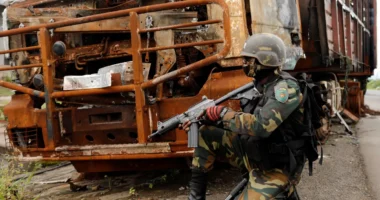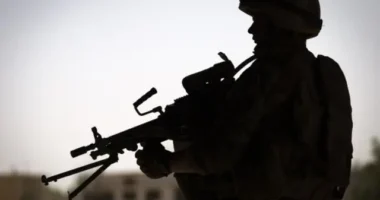A Generation Denied: Cameroon’s Separatist Conflict Shutters Schools, Shatters Futures
By Andre Momo
The halls of learning across Cameroon’s English-speaking regions have fallen silent—not by choice, but by violence. An October 2024 Associated Press report paints a harrowing picture of the educational toll exacted by the prolonged separatist conflict in Southern Cameroons. With 1.4 million Cameroonian children in urgent need of educational support, the crisis is not only robbing a generation of their right to learn—it’s putting the very future of a region at risk.
The statistics are devastating. Across West and Central Africa, 2.8 million children have seen their education disrupted by conflict, with Cameroon representing one of the hardest-hit countries. In the Northwest and Southwest regions—collectively known by pro-independence activists as Ambazonia—classrooms have become battlegrounds, schools burned or abandoned, and teachers living under threat.
The War on Education
Since 2016, what began as a peaceful protest movement by Anglophone teachers and lawyers against marginalization by the Francophone-dominated central government has spiraled into a deadly armed conflict. As violence escalated, so did the targeting of educational institutions. Both state forces and separatist groups have been accused of undermining the school system—one through occupation and militarization, the other through enforced school boycotts and threats to educators.
In many rural communities, schools have remained closed for years. Even in urban centers, fear of attacks looms large over students and teachers alike. Entire cohorts of children have grown up knowing neither the classroom nor the comfort of academic routine.
“For years now, we’ve had to run every time we heard gunshots. My school is now a military base,” recounts a 15-year-old girl displaced from Bamenda, now living in the Littoral region. Her story is one among thousands.
Displacement, Trauma, and Lost Futures
The conflict has displaced over one million people, including hundreds of thousands of school-age children. Many now live in precarious conditions as internally displaced persons (IDPs) or refugees in neighboring Nigeria. Few have access to formal education in these conditions. Trauma, language barriers, and lack of resources only deepen the educational crisis.
Teachers, too, are victims—some targeted by separatists for defying school boycotts, others harassed or arrested by government forces on suspicion of sympathizing with the opposition. The result is a severe shortage of qualified educators and a crippled learning infrastructure.
A Humanitarian Crisis Demanding Urgent Response
Humanitarian organizations, including UNICEF and international NGOs, are calling for immediate intervention to rebuild schools, provide psychosocial support, and fund alternative education programs. Yet responses have been slow, underfunded, and often constrained by the same insecurity that plagues the region.
BaretaNews notes that while international donors express concern, meaningful action remains limited. Funding gaps persist, and local initiatives often operate without institutional backing. Children are falling through the cracks.
BaretaNews: Education Is Resistance
Education is not just a right—it is a form of resistance against oppression, ignorance, and generational trauma. A society that loses its schools loses its future.
At BaretaNews, we call for:
-
An immediate ceasefire around all educational institutions in the Anglophone regions.
-
UN and African Union-led efforts to establish protected “education corridors” in conflict-affected zones.
-
Sustained funding for alternative learning platforms, teacher support, and school rehabilitation projects.
-
A long-term political solution that recognizes the cultural and linguistic identity of the Anglophone people, ensuring education is not a weapon, but a bridge to peace.
The world must not allow another generation to be lost to war. Cameroon’s children deserve more than fear and exile—they deserve chalkboards, classmates, and a chance to dream.





